#kiddush cup
Text

Fabergé Kiddush Cup by Zvezdin's Workshop
280 notes
·
View notes
Text
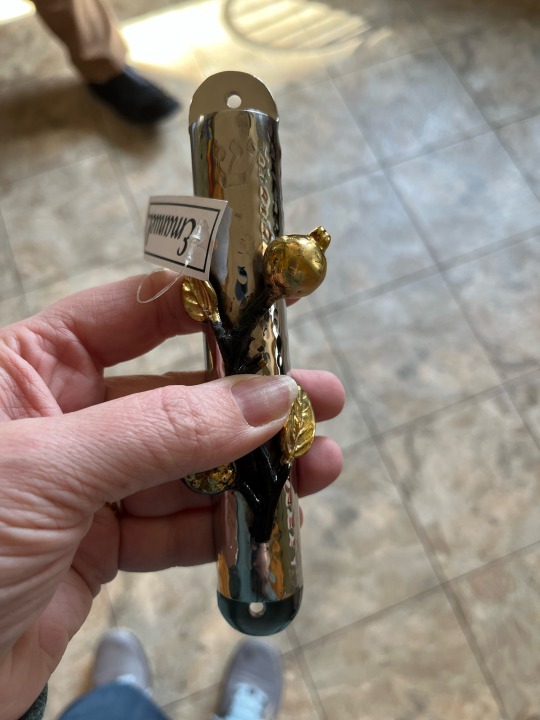

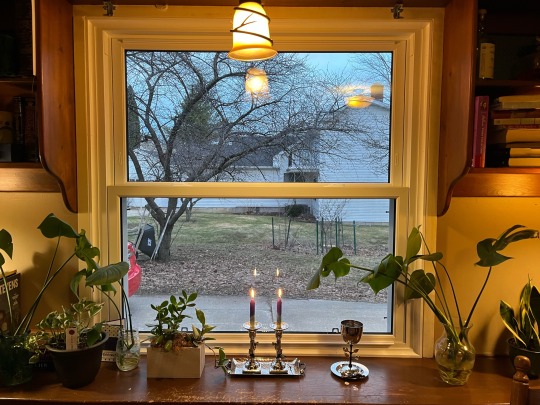
To celebrate my conversion a dear friend gifted me with a mezuzah and klaf, the mezuzah matching my Shabbat candle sticks and the Kiddush cup he gave me for Hanukkah.
To say that I am touched would be a woeful, woeful understatement…
#my words#my photography#jumblr#judaica#jewish#jewblr#shabbat#kiddush cup#Yair Emanuel#mezuzah#jew by choice#pomegranates#kiddush#judaism
262 notes
·
View notes
Text

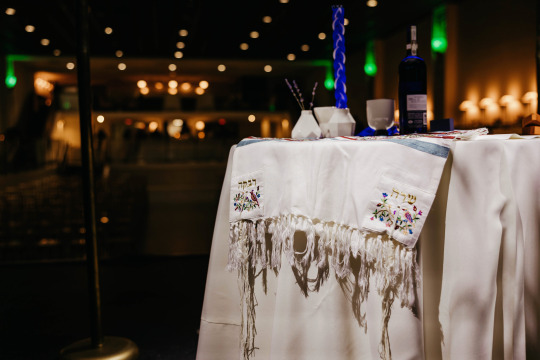


wedding details
40 notes
·
View notes
Photo

Made from silver and painted with blue enamel, the deep blue color of this unique and modern kiddush cup is the perfect reminder of the first line of Kiddush. Made in Italy, this cup is great as a gift or as the crowning piece of any Judaica collection.
0 notes
Text
Jewish students at some vague "in the past" point: "Hey Rabbi whatcha doing?"
Autistic Rabbi who is totally not stimming, about to invent a new Minhag: "Oh haven't you heard?"
#shokeling#niggunim#tying shoes in specific order#staying up all night learning#repeating words#holding kiddush cup in certain way#hoshanot#not boiling an even number of eggs#jumblr#judaism#if jew know jew know#actually autistic
308 notes
·
View notes
Photo

SILVER KIDDUSH WINE GOBLET | LISTING
22 notes
·
View notes
Text
@starrynightinblue replied to your post “Don’t get me wrong, I’m agnostic, my viewpoint on...”:
If you don‘t think that religion is regressive and silly, you need to watch more youtube videos with US Republicans in them. Just listen to their politicians talk about policies. You, too, can be cured of your misconception.
my friend, it might behoove you to remember that religion is, in fact, a very broad category that is not solely defined by fundamentalist christianity and/or christofascism as espoused by a party of politicians in the united states
#starrynightinblue#conversating#there are in fact other religions in the world#and they are different#remarkably there are many ways in which people engage with the broad category known as 'religion'#this is a hopelessly parochial and honestly sorta bigoted response#and i hope you can recognize that and reconsider#like. god! what a thing to wake up to this morning#eta: realized it's possibly relevant that i personally am jewish#me saying kiddush over a cup of wine every week: i stay regressive and silly :3
44 notes
·
View notes
Text
ppl keep posting their happy jewish kitties celebrating holidays with them but my cat is unfortunately deeply antisemitic 😞
#knocks the kiddush cup + candles off the table regularly#once threatened marc with the challah knife#knocks anything with hebrew on it onto the floor with PRECISION#a few days ago she put her whole body and ass on top of the challah#smh....
17 notes
·
View notes
Text
hmmmmmmmmm.
#in the tags to ease my paranoia a little but i really gotta put these thoughts out there#the fact that my grandmother was the one to tell me we had jewish family a couple generations before her#and that growing up i would watch an american tail a lot when i visited her#like it was one of my favorite movies as a kid#and on top of that. after years of not watching it i did end up watching it i think the last time i visited her#also the immense nostalgia i felt eating dinner last night. the flavor was exactly something i remember from her food somehow#even though i didnt cook it any differently except maybe adding a little more paprika#on top of using the wine glass she gave me as my kiddush cup.#awesome. very cool. not sure what this all means but okay
0 notes
Text
I DESIRE A NEW EAR PIERCING AND A VERY SHARP FOLDING KNIFE
#ill probably get the peircing in the spring#and ill probably buy a kiddush cup before i get the knife
1 note
·
View note
Text
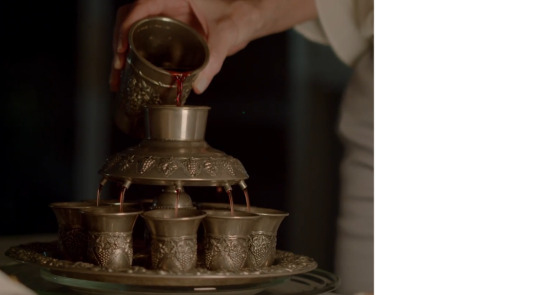
just found out that wine fountains exist;
even though i'm not a drinker, i 100% want one
photo source: screenshot [timestamp 14:05] from New Yorker documentary Tuesco (2022)
1 note
·
View note
Photo
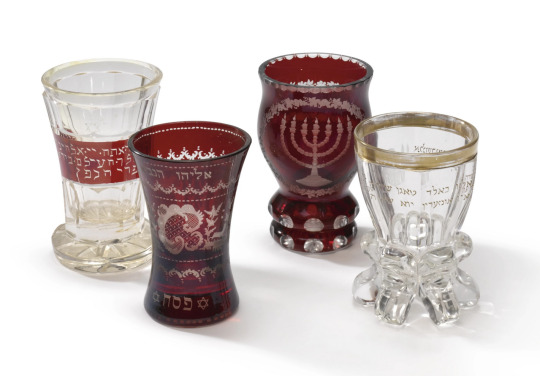
Three glass kiddush cups, probably Bohemian, mid-19th century
126 notes
·
View notes
Text
Actually don't listen to me. I'm an impulse buyer with credit cards. You want a nice looking pitcher and basin to perform the hand washing mitzvot? That's an excellent opportunity to go thrifting! You might even find Judaica there, like a Chanukkiyya perhaps?
You don't want to wait 8 years for Shabbat candles to arrive from Israel? Ask your rabbi! When I asked her if you can reuse a Havdalah candle, she sensed I was worried about the cost of buying all these candles and said her shul has tons of extras.
You absolutely do need a Chumash, a Tanakh, and probably a study Bible too... but Sefaria has all that and more! Especially the Talmud and other Rabbinic sources! It literally blows my mind that this site exists and is free.
But what about all the books on Jewish history and philosophy? What about textbooks for Modern and Biblical Hebrew? See if there are scanned versions online, or go to your local library. Invest in notecards, you're going to want to write down prayers and such, this will especially help if you don't own the books you're studying from.
It's a good idea to have a Siddur, but your shul will most definitely have their own, and as others have told me, you can ask your Rabbi if you can borrow one to take home (make sure to treat it with reverence).
If you want to start baking Challah and are living on your own, or maybe in a dorm room, see if there are community cooking spaces so you don't have to buy your own materials, or just ask your parents if they can gift you some kitchenware because "You want to get into baking."
You literally don't need anything other than a cup that you think is pretty and has meaning to you for the Kiddush. And don't splurge, I've seen hundreds of very attractive Kiddush sets and candle holders and all that for modest prices.
And take it slowly! Don't buy everything at once. We're nowhere near close to Chanukka right now, so don't even put that in your mind. If you want to acquire holiday items, focus on Pesach and worry about other festivals in their due time, let your wallet recover a little. This also goes for Shabbat! You don't need a pristine set of everything all at once, I'm just an idiot. You can slowly build up your perfect beautiful intricate table as the months go by.
#conversion obviously costs more money when it requires study and all the materials therein#but you can do it on the cheap#jewish convert#jew by choice#gerim#jewish#jumblr
400 notes
·
View notes
Text
How to Immediately Ingratiate Yourself in [Most] Jewish Communities
(*caveat that I'm an American, liberal Jew, so my experiences are not universal despite being common)
So you've just started going to shul and you're worried about fitting in with the congregation. Or, perhaps, you're moving out of the community you converted in and are worried about finding your place in a new community. Maybe you're switching shuls. Whatever the reason, you're starting in a new community and want to be accepted right away. Here are some tips for becoming a rapidly accepted fixture in the community:
If your community has a weekday minyan, go to minyan. That will show you who the real machers are in the community: the ones who make services happen regularly and who aren't shy about calling or texting people to get butts in seats. If you're Jewish, you might be Jew #10, the perennial hero of daveners everywhere. If not, you're communicating to them that possibility in the future. (No one was more excited for me to finish conversion than the minyan regulars.)
Okay but what if I'm a woman (or not halachicly male person) attending a non-egalitarian community? If it's liberal orthodox community and/or has a partnership minyan, I'd still consider going. I attended morning minyan at my Modern Orthodox shul for months before I completed my conversion because it was less awkward than going to the Conservative minyan and having to clarify that no, they still couldn't count me yet. (And I really liked the people and the post-minyan drash the rabbi would give.) They were actually delighted to have me holding up the women's side of the mechitza and welcoming in the occasional women who would come for a yahrzeit.
Do you have rhythm and/or are possessed of decently good coordination? Learn the cup song! [Tutorial] People will be very excited albeit potentially confused if it comes out that you didn't grow up going to Jewish summer camp. (I'd just tell them you saw the song on the internet and thought it looked fun.)
Are you musically talented or a semi-competant guitar player? Many communities would love to involve you in the songful parts of the service if you let leadership know.
In general, pay attention to what your community is always begging for volunteers for, especially things you can do as a non-Jew or not-quite-yet-Jew if that's your situation, and sign up for one or two things you think you'd be good at. I would say it's better to pick one thing and focus your energy on being THAT guy rather than trying to do a little of everything (voice of experience here.) Real life examples I can think of: being a greeter, arranging set-up for events, helping out with food prep such as kiddush or post-minyan bagels, running groceries to homebound congregants, delivering mishloach manot if your community does that, childcare or assisting with children's activities if you like kids, etc.
Put a fair amount of energy into remembering people's names and faces, and try to work out early who is related to whom. Bonus points if you can file away information about their lives that they tell you during your conversations with them.
If you're asked to do honors by the gabbai, try to say yes to anything you know how to do and are qualified to do halachicly. If you're not Jewish, many liberal communities will still let you open the ark or take a multi-person aliyah with someone who is Jewish, or have you read some of the contemporary English language prayers. Bonus points for if you are able to learn and perform hagbah (especially if you're left-handed/able to hagbah when the sefer Torah is heavy on the left side.)
Honestly, if you're between the ages of 18 - 35, most communities will be thrilled you're there and tripping over themselves to get you to come back. In combination with the above? You're their new best friend. If you are older than that or still a minor, they will still be very happy to have another friendly and helpful face, even if it's just that you regularly attend minyan.
Good luck and here's to becoming a beloved fixture in your new community!
510 notes
·
View notes
Photo

A modern take on a traditional look this shabbat kiddush cup and plate are made by gently stretching out fine silver, forming a simple yet striking combination. Perfect for Kiddush or Havdalah for any Jewish home.
0 notes
Text
Since my previous post didn't turn up anything comprehensive like I was hoping for, I'm just going to do an informal writeup of advice on how to approach traditional Jewish observance with limited funds. I am not a rabbi or formal educator or anything official, nor is this in any way exhaustive. This is just based on my experiences as a 30ish year old adult who converted Conservative with no prior familial connections to Judaism and did so on a limited budget. I strive for traditional observance and would describe my practice as leaning more traditional egalitarian or Conservadox rather than what is most common for typical Conservative Jews in the US.
Okay? Okay.
Taking up traditional observance on a limited budget
So you're looking into traditional Jewish observance for the first time, either as a reclaimant, baal teshuva, or convert. One of the the first things you probably realized is that this lifestyle - especially the initial startup costs - is expensive. If, like me, you started reeling from the sticker shock but don't want to let that dissuade you out of stubbornness, commitment to Torah, or both, you're probably wondering where to go from here. Here is a list of things that you will need or want for an observant lifestyle that could cost money (some of this may be different based on your community and/or gender):
Ritual use (and practical use) items:
Mezuzot with a kosher klaf inside for each halachic doorway
Shabbat candles and candlesticks
Kiddush cup
Havdalah set
Challah cover
Tzedekah box
Tallit
Tefillin
Handwashing cup (and basin)
Tzniut clothing (this may be incredibly community specific) that is also practical
Tallit katan
A legitimate and covering rain coat
Walking shoes that you're not embarrassed to wear at shul (no really)
Kippot (and any other relevant head coverings, depending on your community)
**Replacing any kitchen utensils, appliances, and dishes that cannot be kashered if you're starting from scratch in keeping kosher, possibly ×2 or even ×3 depending on whether you intend to have a dual kitchen (or a meat, dairy, and pareve set of kitchen items)
Sukkah/building materials and decorations
Lulav & Etrog (these are plants; they are for ritual use but you will need to buy them each year obviously)
Menorah & Chanukah candles
Pesach dishes and kitchen utensils (noted separately because not everything is likely to be able to be kashered over for Pesach from year round) and any additional cleaning and covering items (so much tin foil lol)
Seforim (religious books)
Siddur
Bentcher(s)
Chumash
Tanakh
Practical halacha/practice guides and other basic reference books
Ongoing expenses:
Tzedekah (including special holiday giving such as mishloach manot and extra tzedekah for Purim or maot chitim for Pesach)
Shul membership fees
Kosher food is often more specialized and therefore more expensive, especially Pesach food
Wine or grape juice for Shabbat
Extra food if you're hosting people for Shabbat or potentially to bring to your host's home if you are invited over frequently
Specialized food for holidays (e.g., special fruit on Rosh Hashana, blintzes on Shavuot, brisket or matzah ball soup on Pesach, etc.)
Mikvah costs if you are married, menstruate (or have a spouse who does) and are shomer taharat mishpachat and/or if your community has a tradition of men using the mikvah before, e.g. Shabbat and holidays. Even if you don't need the mikvah for personal reasons, you will still need to pay a fee to immerse for conversion (if relevant) and to toivel any new kitchen items. You will also need bedika cloths for taharat mishpachat.
Housing in an area that allows you to walk to your shul, ideally within an eruv
Day school/Hebrew school if you have kids, and summer camp during the summers
Fees for certain classes and events; especially if you are a convert, you will likely need to pay for an Intro to Judaism course through your shul or at another local shul.
Other things that are extremely helpful, make observant life much easier and more pleasant, may help you fit into your community better, and/or enable more advanced participation, or are just nice to have:
Timers for electronics on Shabbat and Yom Tovim
Light switch covers for Shabbat
Hot water carafe for Shabbat/Yom Tovim
Plata or other type of warmer for Shabbat lunch and/or seudah shlishit
Specific laundry dealibobs (idk what they're actually called) for keeping your tzitzit in good condition
Shabbosdik watch
Shabbos key (especially if you live outside the eruv, but it's good to have for if the eruv goes down anyways)
Light box and/or thrip cloth for bug-checking produce
Bedikat chametz set
Purim costumes
If, like me, you owned exactly zero white clothes before now, you may want to invest in a white outfit for Yom Kippur &/or a kittel
Shofar (if you plan on contributing to your shul that way)
Etrog container and lulav transport bag
Machzor
Haggadot
Aramaic dictionaries for Talmud study
(Depending on the community) some amount of the Talmud
Commentaries
Tikkun
Talpiot
An extra bookshelf for all your Jewish books (not a joke)
Hebrew language classes and learning materials (which are extremely helpful in getting you integrated and up to speed)
This list doesn't even touch on things you might just want, like attractive judaica (hiddur mitzvah), jewelry, Jewish art and decor, etc.
(I also didn't touch on things that are part of major simchas such as bnei mitzvot or weddings, or travel to Israel, or studying in seminary, or other significant but highly specific expenditures that are unfortunately outside the scope of this one layperson's tumblr post)
Oy, that's a lot! This list (with a few exceptions) was generated by me going through everything I've had to invest in over time and ongoing expenses (or that I've had to find a workaround for), or things that are on my list for later when I have the funds.
I'm sure there's plenty I forgot. Where to even start?
Well, the first thing to note is that what I have took seven and a half years (and counting) to obtain, so don't expect to compile this all at once, and don't worry that you'll have to have all that money/resources marshaled up front. It will take time, and that's okay!
The other good news is that while some of this is nice to have, there's a lot that is not immediately (or ever) necessary for most/all folks to personally own, even if it is common for observant folks to own them.
A reality: Sometimes you're going to feel poor, and there will likely be a lot of people in your community who just, won't get it. Sometimes those people are in leadership. Yes this sucks and is sometimes really painful.
A counterbalance to that reality: A lot of people and communities are extremely generous and kind, even if they don't quite get it. Tzedekah is a huge mitzvah, and it is an added bonus for a lot of folks if that tzedakah goes toward enabling another Jew to observe more mitzvot. Hosting is also a major mitzvah. By accepting other people's help and being a guest at their Shabbos table, you are actually doing them a favor by giving them an opportunity to give tzedakah and host. Drill that into your head now, and early; don't be ashamed to ask for and receive help.
Now that I've laid all that out, some general advice. I will follow up later with specifics for each item from the above lists to the best of my ability in a later post.
Skip the judaica store for anything you can get at a thrift store. Candlesticks? Goodwill. B'samim jar? Find a cute container and throw some spices in there. Kiddush cup? Get a cute cup or wine glass at Target.
Start small, and take on one mitzvah at a time. It can be frustrating to have to wait, but it will help you pace yourself in reshaping your lifestyle, which is actually a very good thing. Also, before you take up a particular new mitzvah, learn deeply about it first so that you understand what is actually required, and what is customary (minhag) or stringency (chumra). You may not need the specialty pre-approved [read: more expensive] version of the thing if you know enough of what you're doing.
See if your shul, another nearby shul, or JCC ever has a community rummage sale. If so, check that out for secondhand menorahs, tallitot, siddurim, etc. (If not, consider suggesting that they do to leadership that organizes events or offer to organize it yourself if you're on that committee.) Also check out thrift stores and secondhand bookstores in particularly Jewish areas.
Talk to your rabbi about your needs. Your rabbi may have good suggestions that are specific to your area/community, may have discretionary funds to help, or may know folks who would be willing to pass on extra judaica they don't need.
Your shul may also have items you can borrow. I was able to, for example, borrow a machzor for the high holidays, and borrow a set of tefillin for nearly two years while I saved up for my own set. (And even then, the rabbi helped cover half of the cost from discretionary funds when I did purchase my own set, and was happy to do so.)
Honestly, just borrow whatever books you can until you can get your own. You can do this from your shul, your shul's library if they have one, or even the public library for reference books and certain commentaries. I would buy them in the following order: the siddur your shul uses, a chumash, a Tanakh, and then whatever else you're interested in. Sefaria.org is an incredible free online resource, but you'll want these for Shabbat and Yom Tovim sooner rather than later.
Talk to your rabbi or shul leadership about reduced membership fees, or join a shul that has a pay-what-you-can fee structure.
Look for classes that are free, have a sliding scale fee structure, or scholarships. If you're dead-set on a particular class and it doesn't advertise reduced fees or scholarships based on need, reach out to the organizers and ask. They might not have advertised it, but would be able to ask if someone would sponsor a student or give you ideas of other funds you could apply for.
Keep a wish list updated, and if friends or family are buying you birthday or holiday gifts, ask for important (and specific) items. I recommend an online registry so that you get the specific thing you need/want.
For specialty kosher food, see if your area has a kosher co-op so you can buy for bulk prices. (This is especially helpful for Pesach.)
These are general suggestions, but there's a lot more. Stay tuned!
331 notes
·
View notes